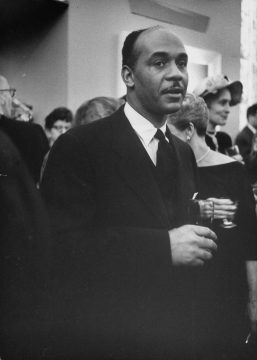Saidiya Hartman in The New York Times:
 “Complexity” was the term that Ralph Ellison deployed most often to describe black life and culture. And it is the term best suited to convey the character of this brilliant, often disapproving and unsparing man. Decades before Toni Morrison’s “Beloved” and “Song of Solomon,” “Invisible Man” (1952) singularly defined the meaning of literary achievement. As a critic, Ellison was no less significant a thinker and stylist. Always, he was a philosopher of black expressive form and an astute cultural analyst.
“Complexity” was the term that Ralph Ellison deployed most often to describe black life and culture. And it is the term best suited to convey the character of this brilliant, often disapproving and unsparing man. Decades before Toni Morrison’s “Beloved” and “Song of Solomon,” “Invisible Man” (1952) singularly defined the meaning of literary achievement. As a critic, Ellison was no less significant a thinker and stylist. Always, he was a philosopher of black expressive form and an astute cultural analyst.
I first encountered Ellison through the scrim of Larry Neal’s 1970 essay “Ellison’s Zoot Suit,” so I knew what I needed to read for — the invaluable critical propositions about African-American culture, the dazzling enactment of blues vernacular in modernist prose, artistic achievement steeped in reference to the music and an eye capable of discerning what Zora Neale Hurston described as the distinctive asymmetry and angularity that were the most striking manifestations of black style and the will to adorn. I also knew what I had to read past — the cult of the masculine hero and an aesthetic project that “restores to man his full complexity” and to the native son truth and revelation, while abandoning the daughter to the chaos of the underworld.
More here.
